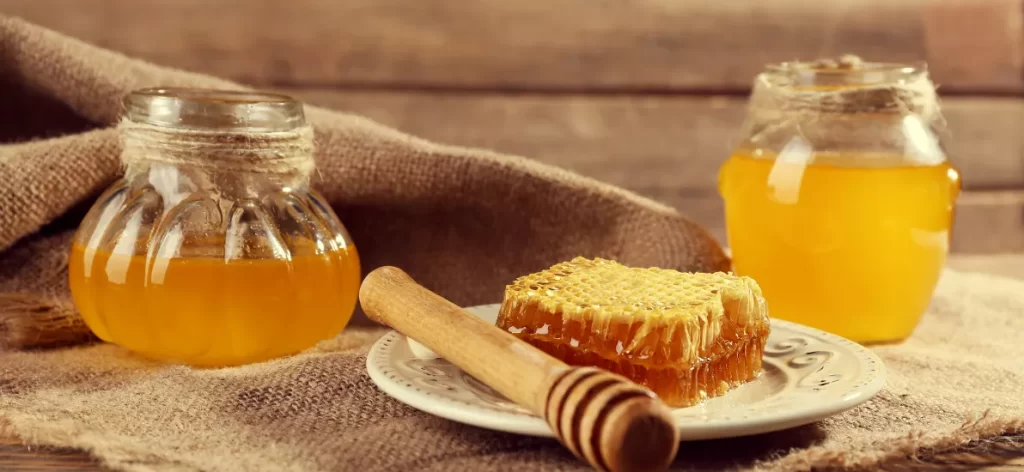People have been keeping bees and eating their honey for thousands of years.
Eating honeycombs is one of the ways you can enjoy the fruits of bees. It can offer many health benefits, from treating a variety of infections to a healthier heart and liver.
However, eating honey directly from the honeycomb can also pose some risks.
In this article, I will try to answer the following questions: Is honeycomb edible? How to eat honeycomb? Can you eat honeycomb? I will also list the benefits and dangers of honeycombs.

What Is Honeycomb And Is Honeycomb Edible?
Honeycomb is a natural product that bees produce to store honey and pollen or to house their larvae (broods).
It consists of a series of hexagonal cells built of beeswax that contain mostly raw honey.
Raw honey differs from commercial honey in that it is not pasteurized or filtered.
The honeycomb may also contain bee pollen, propolis and royal jelly – additional bee products with potential health benefits. But they can probably only be found in small quantities.
You can eat the whole honeycomb, including honey and the wax cells that surround it.
Raw honey has a more textured consistency than filtered honey. In addition, wax cells can be chewed like a chewing gum.
Honeycomb Is Rich In Certain Nutrients
Honeycomb is rich in carbohydrates and antioxidants. It also contains several other nutrients in smaller traces.
Its main component is raw honey, which offers small amounts of protein, vitamins and minerals, but consists of 95-99% sugar and water.
Because it is not processed, raw honey contains enzymes such as glucoside oxidase, which give honey antimicrobial and antibacterial properties.
Such enzymes are destroyed by heating and filtration used to process most commercial honey.
Moreover, raw honey is less likely to be contaminated with sweeteners such as corn syrup with high fructose content and it also has more antioxidants than processed honey.
Antioxidants are beneficial herbal compounds that promote health, reduce inflammation and protect your body from diseases. Their level can be up to 4.3 times higher in raw than in processed honey.
Polyphenols are the main type of honey antioxidant. Research suggests that they may help reduce the risk of diabetes, dementia, heart disease, and even certain types of cancer.
The honeycomb also contains beeswax which provides healthy hearts with long-chain fatty acids and alcohols. These compounds can help lower cholesterol levels.
Honeycombs Can Improve Your Heart Health
Studies show that long-chain fatty acids and alcohols found in beeswax can reduce high blood cholesterol levels, a risk factor for heart disease.
For example, one review stated that beeswax alcohols can help lower “bad” LDL cholesterol by as much as 29%, while increasing “good” HDL cholesterol by 8-15%.
However, the studies in this review used high levels of isolated alcohols derived from beeswax, making it difficult to know whether small amounts of beeswax in a honeycomb will produce the same effects.
However, honey itself may have the same ability to lower cholesterol.
In a small study, participants were given 70 grams of sugar or honey a day. After 30 days, those in the honey group raised their “good” HDL cholesterol by 3.3% and reduced their “bad” LDL cholesterol by 5.8%.
Furthermore, replacing sugar with honey can also help lower triglyceride levels by up to 19%.
Furthermore, honey antioxidants can help dilate the arteries that lead to your heart. This in turn can increase blood flow and lower blood pressure, potentially reducing the risk of blood clots, heart attacks and strokes.
Honeycombs Can Protect You From Infections
Honeycombs can increase your body’s ability to fight certain bacteria and fungi.
For example, test tube tests show that beeswax extracts can provide protection against fungi and bacteria that cause disease, including Staphylococcus aureus, Candida albicans, Salmonella enterica, and E. coli.
Honey is also known for its antimicrobial properties. Research shows that it could help protect your intestines from the parasite Giardia lamblia.
However, human studies are needed to confirm these effects.
Honeycomb Can Reduce Cough In Children
Honeycombs can also help reduce coughs in children.
Children are prone to upper respiratory tract infections which can cause coughing. Research shows that honey can help control this cough.
In one study, it was recorded that eating only 1/2 teaspoon (2.5 ml) of buckwheat honey 30 minutes before bedtime was more effective than cough syrup in the effort of reducing cough discomfort in children.
The group of children who were fed buckwheat honey also slept better than those who have taken cough syrup or nothing at all.
Honeycomb probably provides the same benefits because it is rich in honey.
However, honey contains spores of the bacterium C. botulinum, which can harm young babies. For this reason, honey or honeycombs should not be given to children under 12 months.
Honeycomb Is An Alternative To Sugar For People With Diabetes
Can diabetics consume honeycomb? Yes, honeycombs can be a good alternative to sugar for people with diabetes.
This is partly because honey is much sweeter than sugar, so smaller amounts are needed to achieve the same level of sweetness. In addition, honey appears to increase blood sugar levels less than refined sugar.
However, honey still raises blood sugar levels, so people who have diabetes should not consume too much.
Moreover, the alcohols found in beeswax can help reduce insulin resistance, a condition that contributes to high blood sugar.
One small study in people with non-alcoholic fatty liver disease (NAFLD) – a medical condition in which fat accumulates in your liver, often accompanied by insulin resistance – found that alcoholic beeswax extracts reduced insulin levels by 37%.
These lower insulin levels may indicate reduced insulin resistance, which could also benefit diabetics.
Keep in mind that better quality studies are needed.
It Can Improve Liver Function
Honeycombs can also contribute to a healthier liver.
In one 24-week study, a mixture of beeswax alcohol was given daily to people with liver disease. Significantly, 48% of people in the beeswax group reported a reduction in symptoms – such as abdominal pain, bloating and nausea – compared to only 8% in the placebo group.
Moreover, liver function returned to normal in 28% of those who drank beeswax alcohols – compared to none in the placebo group.
While these results seem promising, it is unclear how many honeycombs you need to eat to achieve the same benefits. Therefore, more studies on humans are needed before strong conclusions can be drawn.
How To Eat Honeycomb?
Honeycombs can be consumed in different ways.
While you can eat it the way it is, it makes a great spread for warm bread or English muffins. Honeycomb can also be used as a sweetener in homemade desserts – or on top of pancakes, oatmeal or yogurt.
Some people may enjoy a piece of honeycomb on top of a salad or with fruit, charcuterie or old cheeses.
Honeycombs are likely to be found at your local health food store or farmers, although you can also buy it online.
When choosing a honeycomb, keep in mind that the darker the honey, the richer its beneficial compounds, such as antioxidants.
The honeycomb is stored for a long time at room temperature. The longer you store it, the more likely it is to crystallize – but its crystallized form remains edible.
Potential Risks And Dangers
Honeycomb is usually considered safe to eat. So, this removes the dilemma of the question: Is honeycomb edible?
However, because it contains honey, there is a risk of contamination with C. botulinum spores. This is especially harmful for pregnant women and children under 12 months.
In some cases, eating large amounts of honeycombs can cause stomach obstruction.
To reduce the risk of this happening, it may be best to avoid eating large amounts of honeycombs a day – or to simply spit out wax cells.
Moreover, people who are allergic to bee venom or pollen may want to be careful when eating honeycombs because they can cause an allergic reaction.
It is also important to note that, despite the many potential benefits, honeycomb remains very high in sugar, so it is best to eat it in moderation.
Conclusion
Honeycomb is a natural bee product that consists of waxy hexagonal cells that contain raw honey. By writing this article, I have tried to answer most of the questions you may have had, such as: Is honeycomb edible? How to eat honeycomb? Can you eat honeycomb?
Honey and its comb are edible and offer a number of health benefits, such as fighting infections and improving heart health. Honeycombs can also boost liver function and serve as a sugar alternative for people with diabetes.
Accordingly, honeycomb remains rich in sugars, so it should be consumed in moderation.

